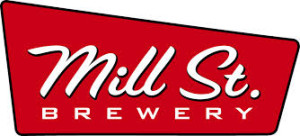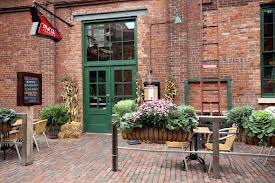 News broke on Friday that AB-Inbev is purchasing Toronto’s Mill Street Brewing for an undisclosed amount (there are a number of sources, but I will direct those interested to Canadian Beer News‘ piece on the story – read here).
News broke on Friday that AB-Inbev is purchasing Toronto’s Mill Street Brewing for an undisclosed amount (there are a number of sources, but I will direct those interested to Canadian Beer News‘ piece on the story – read here).
Reaction, predictably, has been mixed, with one cluster of people accusing Mill Street of selling out and another essentially shrugging their shoulders. Allow me to avoid both groups and offer a different perspective. The move doesn’t mean nothing, but neither does it say that this is Nightmare on Mill Street. Personally I find it somewhat predictable – not Mill Street per se (although I had been hearing vague rumours) – because we have seen an increased level of activity from the big boys in buying up craft breweries. AB-Inbev recently bought both Goose Island and Elysian. Molson-Coors has Granville and Creemore. Even Heineken is now majority owner of Lagunitas. So, we shouldn’t be surprised.
My preference, obviously, would be that Mill Street remained an independent, locally owned company. There is inherent value in having breweries fully connected to their community and something is lost when one of them sells out to a multi-national. I don’t just mean this in a qualitative sense (atlhough I do mean it that way), I also argue we lose something when the beer industry has one less player.
Free market theory says that markets work best when there is a large number of relatively equal players competing both on the basis of price and quality. To me, that kind of sounds like the craft beer segment of the beer market. Sure some players, like Big Rock and Mill Street, are significantly bigger than others, but not so much bigger that they possess an unfair disadvantage over their smaller brethren. All are dwarfed by the size of the big three.
The reality of 21st century capitalism is the opposite of free market theory. It is the practice of huge behemoths duking it out and gobbling anything not moving fast enough (including each other – see AB-Inbev/SABMiller buy-out talks). It is not a free market, per se, but an oligopoly. Fine. That is what we have for better or worse (likely worse in my opinion). That is why successful mid-sized breweries like Mill Street, Steam Whistle, Big Rock, etc. are so important. They increase the diversity of beer offerings and they have the reach to do it in multiple markets (unlike small craft breweries who focus primarily on local sales).
 So, for me, the first consequence of the purchase is the loss of diversity and the gain of modern corporate capitalism. Yes, you will still be able to buy Mill Street brands, but if you think that is enough to negate the effects on a viably competitive market, you are not really paying attention.
So, for me, the first consequence of the purchase is the loss of diversity and the gain of modern corporate capitalism. Yes, you will still be able to buy Mill Street brands, but if you think that is enough to negate the effects on a viably competitive market, you are not really paying attention.
Second, I want to state unequivocally that I believe Mill Street’s line-up, and the quality built into it, will not be compromised. Those worried that the quality of the beer will suffer, that brewmaster Joel Manning and colleagues will be forced to compromise to meet the needs of bean counters or that uniqueness of the brands will be absorbed into the Borg that is AB-Inbev are looking into the past. In the 1990s, the model was to take over a successful craft brewery (e.g., Okanagan Springs, Sleeman, etc.) and either close it, alter it beyond recognition or “dummy down” the beer. No so much these days. The most recent rounds of acquisitions have led to increased distribution, investment in equipment but no real diminution of the beer and its quality. The big boys have figured out that they don’t know how to brew craft beer, so they are leaving it to craft brewers to do that – they just want a cut of the action.
Third, quality of product aside, the purchase does alter Mill Street’s location in the market. Craft brewers compete against each other. But there is also a community of support and an ethos of building craft beer together that tears down the barriers between breweries to some extent. They share a bigger vision of creating more room for craft beer generally. That ethos cannot extend to the big boys. Where before if a Mill Street beer took over a tap line from another craft brewery, that would suck for that brewery but there was solace that it was still an independent craft tap.
Now, when a Mill Street tap moves in, it will be a blow against independent craft beer. I fear their brands will be used in a similar fashion as Rickard’s, Shock Top or (increasingly) Granville Island; they provide a pub “craft” credibility without having to move outside the cradle of the big boy arrangements (free promos, hockey tickets, tap line support, etc.). In reality those beer take taps away from independent craft breweries. Mill Street is now in the awkward position of being inside that “cradle”, rather than working against it.
I am reminded of Unibroue as a relevant counterpoint. Not only are they Exhibit A in demonstrating that corporate takeover need not mean compromise in quality, they have found a way to maintain solid craft credentials despite their profits flowing to Japan (Sapporo). Still – and I can only speak for myself here – I find I hesitate ever so slightly before ordering a Blanche de Chambly.
In a way, the Mill Street purchase is a sign of the maturation of the Canadian craft beer industry. The founders are growing older. They have put 20, 30 years of sweat into building their brewery. Maybe they want to retire. Maybe they just finally want the reward after all those hard years of work. I don’t begrudge them that (although I believe there are other viable options, including selling to the workers). That they want to sell is not overly significant. What is significant is that there are buyers. Craft beer is here, and here to stay. The big boys have figured it out. They tried ignoring it, squashing it, imitating it – nothing has worked. They have realized the only strategy that can work is to join it. And since they don’t know how to brew craft beer the only way they can join is to buy up somebody else.
That last point is not a justification or defence of the sale or of the big boy’s strategies. I just suspect 10 years ago, the big boys didn’t want Mill Street because it didn’t seem worth their while. Now it is. That is a shift we need to pay attention to. Craft beer is stronger than it ever has been, which is why we saw this deal last week.
As a footnote, I observer most of the media are reporting the story as Labatt’s buying Mill Street. This is factually accurate, but I believe it obfuscates the real situation. Labatt’s is wholly owned by AB-Inbev, the largest beer corporation in the world. The descendents of John Labatt do not now own Mill Street; faceless corporate suits in Brazil and Belgium do. It is a shame that Canadian media continue to cling to the facade that somehow the big breweries are still “Canadian” breweries, when they most certainly are not.
So, I will not be boycotting Mill Street. Nor will I bad mouth them. I will continue to evaluate their beer as honestly as I did before. Will I find myself drinking a little less of it? Probably, but with no real intent or purpose in it. Buying independent is just in my DNA.
Those are my two bits. Your thoughts?

October 13, 2015 at 2:33 PM
Well here is the latest on the InBev SabMiller purchase ,
http://www.cbc.ca/news/business/abinbev-sabmiller-deal-reached-1.3268029